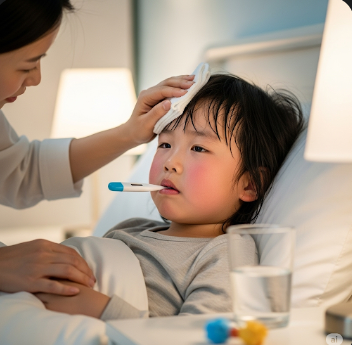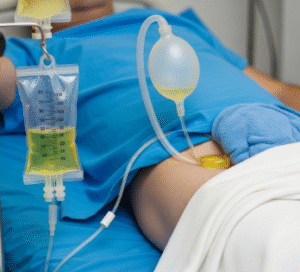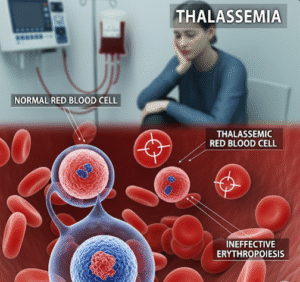Overview
Fever in children is a common symptom indicating the body’s immune response to infection or illness. It is usually defined as a body temperature above 38°C (100.4°F). While fever itself is not a disease, it can signal underlying infections, inflammatory conditions, or other medical issues. In Korea, pediatric hospitals and clinics provide specialized care for children with fever, including diagnosis, treatment, and monitoring to ensure safe and effective management.
Key Facts
▶ Prevalence: Fever is one of the most frequent reasons parents bring children to clinics.
▶ Common Causes: Viral infections, bacterial infections, immunizations, teething, or inflammatory conditions.
▶ Associated Symptoms: Chills, irritability, poor appetite, fatigue, sweating, and dehydration.
▶ Treatment Options in Korea: Pediatric evaluation, antipyretics, infection management, hydration therapy, and hospital care if needed.
▶ Urgency: High fever, persistent fever, or fever with other warning signs requires prompt medical attention.
What is Fever in Children?
Fever in children is a temporary increase in body temperature caused by the body’s immune response. It often serves as a protective mechanism, helping fight infections.
▶ Low-Grade Fever: 38–38.9°C, often manageable at home.
▶ Moderate Fever: 39–39.9°C, may require closer monitoring or medical evaluation.
▶ High Fever: ≥40°C, can be concerning and may require urgent care.
▶ Febrile Seizures: Occur in some children with rapid temperature rise, usually between 6 months and 5 years.
▶ Duration: Most fevers resolve within 2–3 days; persistent or recurrent fever may indicate underlying illness.
Note: Fever is a symptom, not a disease, and identifying the cause is critical to appropriate treatment.
What Symptoms Are Related to Fever in Children?
▶ Chills and Shivering: Often precede the rise in body temperature.
▶ Irritability or Fussiness: Children may appear unusually restless or unhappy.
▶ Poor Appetite: Decreased desire to eat or drink.
▶ Fatigue: Tiredness or reduced activity levels.
▶ Sweating: Helps regulate body temperature after fever spikes.
▶ Headache or Body Aches: Common with viral or bacterial infections.
▶ Vomiting or Diarrhea: May accompany infections like gastroenteritis.
▶ Rapid Breathing or Dehydration Signs: Dry mouth, sunken eyes, or reduced urination.
What Causes / Possible Causes
Fever in children can be triggered by infections, inflammatory conditions, or environmental factors:
▶ Viral Infections: Common cold, influenza, COVID-19, respiratory syncytial virus (RSV), or gastroenteritis.
▶ Bacterial Infections: Ear infections, urinary tract infections, pneumonia, meningitis, or tonsillitis.
▶ Immunizations: Mild fever is a common reaction after routine vaccines.
▶ Teething: May cause a slight rise in temperature, though not usually high fever.
▶ Inflammatory Conditions: Juvenile arthritis, Kawasaki disease, or autoimmune disorders.
▶ Heat-Related Causes: Overdressing or environmental heat exposure.
▶ Medication-Induced Fever: Certain antibiotics or medications can trigger fever.
▶ Other Causes: Rarely, metabolic or endocrine disorders may cause persistent fever.
Note: Determining the cause of fever is essential for effective management and prevention of complications.
When Should I See a Doctor?
▶ Infants <3 Months: Any fever requires immediate evaluation.
▶ High Fever: ≥40°C (104°F) or rapidly rising temperature.
▶ Persistent Fever: Lasting more than 3 days without improvement.
▶ Severe Symptoms: Difficulty breathing, seizure, persistent vomiting, lethargy, or signs of dehydration.
▶ Rash or Purple Spots: Could indicate serious infection.
▶ Underlying Health Conditions: Children with chronic illnesses or immunodeficiency.
▶ Febrile Seizures: Occurrence requires medical assessment to rule out serious causes.
Tip: Korean pediatric hospitals provide comprehensive diagnostic testing, including blood tests, urine analysis, imaging, and specialist consultation, to identify fever causes accurately.
Care and Treatment
Management of fever in children focuses on comfort, hydration, and treating the underlying cause:
▶ Hydration: Encourage fluids such as water, oral rehydration solutions, or breast milk.
▶ Comfort Measures: Light clothing, lukewarm baths, and maintaining a cool environment.
▶ Antipyretics: Acetaminophen or ibuprofen, dosed appropriately for the child’s age and weight.
▶ Monitor Symptoms: Track temperature, behavior, and response to treatment.
▶ Treat Underlying Infections: Antibiotics for bacterial infections or supportive care for viral illnesses.
▶ Nutrition: Small, frequent meals or breastfeeding to maintain energy.
▶ Rest: Ensure adequate sleep and reduce physical exertion.
▶ Avoid Overuse of Medications: Use antipyretics only when necessary and under medical guidance.
Treatment Options in Korea
Medical Evaluation:
▶ Physical Examination: Assess vital signs, hydration status, and general health.
▶ Laboratory Tests: Blood counts, urine tests, and cultures if infection is suspected.
▶ Imaging Studies: X-ray, ultrasound, or CT scan when necessary for infection or inflammation assessment.
▶ Specialist Consultation: Pediatricians, infectious disease specialists, and emergency physicians collaborate for accurate diagnosis.
Advanced Therapies:
▶ Hospitalization for Severe Cases: IV fluids, oxygen therapy, and close monitoring.
▶ Targeted Medications: Antibiotics, antivirals, or anti-inflammatory drugs depending on cause.
▶ Multidisciplinary Approach: Combines pediatric care, nursing support, and nutritional guidance.
▶ Fever Management Programs: Specialized clinics in Korea offer education, monitoring, and follow-up for children with recurrent or complex fever.
Rehabilitation & Support:
▶ Parent Education: Recognize warning signs, measure temperature accurately, and administer medications safely.
▶ Follow-Up Care: Ensures complete resolution of fever and underlying conditions.
▶ Specialist Clinics: Korean hospitals provide integrated pediatric fever care, combining diagnosis, treatment, and family education.
Outcome: With early evaluation and comprehensive treatment in Korea, fever in children can be effectively managed, ensuring comfort, safety, and rapid recovery while addressing the underlying cause.













